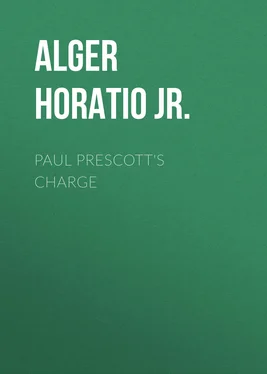Horatio Alger - Paul Prescott's Charge
Здесь есть возможность читать онлайн «Horatio Alger - Paul Prescott's Charge» — ознакомительный отрывок электронной книги совершенно бесплатно, а после прочтения отрывка купить полную версию. В некоторых случаях можно слушать аудио, скачать через торрент в формате fb2 и присутствует краткое содержание. Издательство: Иностранный паблик, Жанр: foreign_children, literature_19, foreign_antique, foreign_prose, на английском языке. Описание произведения, (предисловие) а так же отзывы посетителей доступны на портале библиотеки ЛибКат.
- Название:Paul Prescott's Charge
- Автор:
- Издательство:Иностранный паблик
- Жанр:
- Год:неизвестен
- ISBN:нет данных
- Рейтинг книги:4 / 5. Голосов: 1
-
Избранное:Добавить в избранное
- Отзывы:
-
Ваша оценка:
- 80
- 1
- 2
- 3
- 4
- 5
Paul Prescott's Charge: краткое содержание, описание и аннотация
Предлагаем к чтению аннотацию, описание, краткое содержание или предисловие (зависит от того, что написал сам автор книги «Paul Prescott's Charge»). Если вы не нашли необходимую информацию о книге — напишите в комментариях, мы постараемся отыскать её.
Paul Prescott's Charge — читать онлайн ознакомительный отрывок
Ниже представлен текст книги, разбитый по страницам. Система сохранения места последней прочитанной страницы, позволяет с удобством читать онлайн бесплатно книгу «Paul Prescott's Charge», без необходимости каждый раз заново искать на чём Вы остановились. Поставьте закладку, и сможете в любой момент перейти на страницу, на которой закончили чтение.
Интервал:
Закладка:
Jr. Horatio Alger
Paul Prescott's Charge
PREFACE
“PAUL PRESCOTT’S CHARGE” is presented to the public as the second volume of the Campaign Series. Though wholly unlike the first volume, it is written in furtherance of the same main idea, that every boy’s life is a campaign, more or less difficult, in which success depends upon integrity and a steadfast adherence to duty.
How Paul Prescott gained strength by battling with adverse circumstances, and, under all discouragements, kept steadily before him the charge which he received from his dying father, is fully told; and the author will be glad if the record shall prove an incentive and an encouragement to those boys who may have a similar campaign before them.
I
SQUIRE NEWCOME
“HANNAH!”
The speaker was a tall, pompous-looking man, whose age appeared to verge close upon fifty. He was sitting bolt upright in a high-backed chair, and looked as if it would be quite impossible to deviate from his position of unbending rigidity.
Squire Benjamin Newcome, as he was called, in the right of his position as Justice of the Peace, Chairman of the Selectmen, and wealthiest resident of Wrenville, was a man of rule and measure. He was measured in his walk, measured in his utterance, and measured in all his transactions. He might be called a dignified machine. He had a very exalted conception of his own position, and the respect which he felt to be his due, not only from his own household, but from all who approached him. If the President of the United States had called upon him, Squire Newcome would very probably have felt that he himself was the party who conferred distinction, and not received it.
Squire Newcome was a widower. His wife, who was as different from himself as could well be conceived, did not live long after marriage. She was chilled to death, as it was thought, by the dignified iceberg of whose establishment she had become a part. She had left, however, a child, who had now grown to be a boy of twelve. This boy was a thorn in the side of his father, who had endeavored in vain to mould him according to his idea of propriety. But Ben was gifted with a spirit of fun, sometimes running into mischief, which was constantly bursting out in new directions, in spite of his father’s numerous and rather prosy lectures.
“Han-nah!” again called Squire Newcome, separating the two syllables by a pause of deliberation, and strongly accenting the last syllable,—a habit of his with all proper names.
Hannah was the Irish servant of all work, who was just then engaged in mixing up bread in the room adjoining, which was the kitchen.
Feeling a natural reluctance to appear before her employer with her hands covered with dough, she hastily washed them. All this, however, took time, and before she responded to the first summons, the second “Han-nah!” delivered with a little sharp emphasis, had been uttered.
At length she appeared at the door of the sitting-room.
“Han-nah!” said Squire Newcome, fixing his cold gray eye upon her, “when you hear my voice a calling you, it is your duty to answer the summons IMMEJIATELY.”
I have endeavored to represent the Squire’s pronunciation of the last word.
“So I would have come IMMEJOUSLY,” said Hannah, displaying a most reprehensible ignorance, “but me hands were all covered with flour.”
“That makes no difference,” interrupted the Squire. “Flour is an accidental circumstance.”
“What’s that?” thought Hannah, opening her eyes in amazement.
“And should not be allowed to interpose an obstacle to an IMMEJIATE answer to my summons.”
“Sir,” said Hannah, who guessed at the meaning though she did not understand the words, “you wouldn’t have me dirty the door-handle with me doughy hands?”
“That could easily be remedied by ablution.”
“There ain’t any ablution in the house,” said the mystified Hannah.
“I mean,” Squire Newcome condescended to explain, “the application of water—in short, washing.”
“Shure,” said Hannah, as light broke in upon her mind, “I never knew that was what they called it before.”
“Is Ben-ja-min at home?”
“Yes, sir. He was out playin’ in the yard a minute ago. I guess you can see him from the winder.”
So saying she stepped forward, and looking out, all at once gave a shrill scream, and rushed from the room, leaving her employer in his bolt-upright attitude gazing after her with as much astonishment as he was capable of.
The cause of her sudden exit was revealed on looking out of the window.
Master Benjamin, or Ben, as he was called everywhere except in his own family, had got possession of the black kitten, and appeared to be submerging her in the hogshead of rainwater.
“O, you wicked, cruel boy, to drown poor Kitty!” exclaimed the indignant Hannah, rushing into the yard and endeavoring to snatch her feline favorite—an attempt which Ben stoutly resisted.
Doubtless the poor kitten would have fared badly between the two, had not the window opened, and the deliberate voice of his father, called out in tones which Ben saw fit to heed.
“What?”
“Come into my presence immejiately, and learn to answer me with more respect.”
Ben came in looking half defiant.
His father, whose perpendicularity made him look like a sitting grenadier, commenced the examination thus:—
“I wish you to inform me what you was a doing of when I spoke to you.”
It will be observed that the Squire’s dignified utterances were sometimes a little at variance with the rule of the best modern grammarians.
“I was trying to prevent Hannah from taking the kitten,” said Ben.
“What was you a doing of before Hannah went out?”
“Playing with Kitty.”
“Why were you standing near the hogshead, Benjamin?”
“Why,” said Ben, ingenuously, “the hogshead happened to be near me—that was all.”
“Were you not trying to drown the kitten?”
“O, I wouldn’t drown her for anything,” said Ben with an injured expression, mentally adding, “short of a three-cent piece.”
“Then, to repeat my interrogatory, what was you a doing of with the kitten in the hogshead?”
“I was teaching her to swim,” said Ben, looking out of the corner of his eye at his father, to see what impression this explanation made upon him.
“And what advantageous result do you think would be brought about by teaching of the kitten to swim, Benjamin?” persisted his father.
“Advantageous result!” repeated Ben, demurely, pretending not to understand.
“Certingly.”
“What does that mean?”
“Do you not study your dictionary at school, Benjamin?”
“Yes, but I don’t like it much.”
“You are very much in error. You will never learn to employ your tongue with elegance and precision, unless you engage in this beneficial study.”
“I can use my tongue well enough, without studying grammar,” said Ben. He proceeded to illustrate the truth of this assertion by twisting his tongue about in a comical manner.
“Tongue,” exclaimed his father, “is but another name for language I mean your native language.”
“Oh!”
Ben was about to leave the room to avoid further questions of an embarrassing nature, when his father interrupted his exit by saying—
“Stay, Benjamin, do not withdraw till I have made all the inquiries which I intend.”
The boy unwillingly returned.
“You have not answered my question.”
“I’ve forgotten what it was.”
“What good would it do?” asked the Squire, simplifying his speech to reach Ben’s comprehension, “what good would it do to teach the kitten to swim?”
Читать дальшеИнтервал:
Закладка:
Похожие книги на «Paul Prescott's Charge»
Представляем Вашему вниманию похожие книги на «Paul Prescott's Charge» списком для выбора. Мы отобрали схожую по названию и смыслу литературу в надежде предоставить читателям больше вариантов отыскать новые, интересные, ещё непрочитанные произведения.
Обсуждение, отзывы о книге «Paul Prescott's Charge» и просто собственные мнения читателей. Оставьте ваши комментарии, напишите, что Вы думаете о произведении, его смысле или главных героях. Укажите что конкретно понравилось, а что нет, и почему Вы так считаете.












